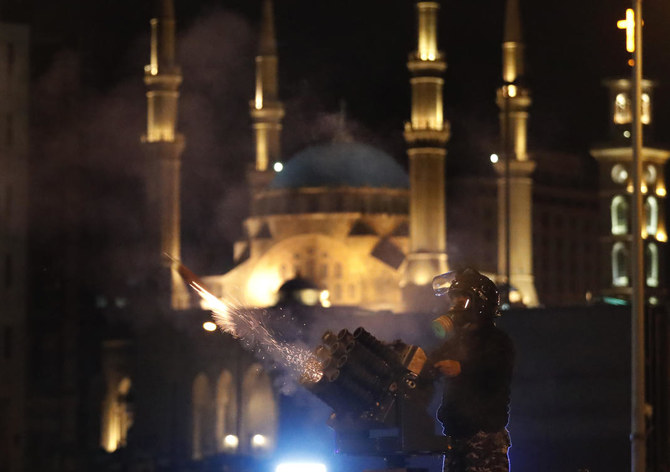
by AP theguardian.com — Thousands of Lebanese protesters defiantly returned on Sunday to rally outside parliament in the capital, Beirut, hours after security forces chased them out, using teargas and rubber bullets and injuring dozens. On Saturday night into Sunday there was one of the most violent crackdowns on protesters since nationwide anti-government demonstrations began two months ago, leading to the resignation of prime minister Saad Hariri on 29 October. Attackers in northern Lebanon also set fire to the offices of two major political parties, the state-run National News Agency said. The protesters who showed up in Beirut on Sunday chanted against the security crackdown and called for an independent new head of government unaffiliated with established political parties. The crowd, many raising Lebanese flags, chanted: “We won’t leave. We won’t leave. Just arrest all the protesters!”
Others raised posters saying the teargas won’t keep them away. “We are crying already,” said one, in a jab at the deep economic crisis the Lebanese people are facing. The streets leading to parliament were filled with men, women and even children. Some huddled in smaller groups while others were lifted on to people’s shoulders as they chanted into megaphones. In the town of Kharibet al-Jindi, an office of the party of the former prime minister Saad Hariri was torched and its windows were broken. In a separate attack in the town of Jedidat al-Juma, assailants stormed an office of the largest party in parliament, affiliated with President Michel Aoun and headed by the foreign minister, Gebran Bassil. The party said the contents of the office had been smashed and burned. Hours earlier in Beirut, security forces had carried out the most violent crackdown on protesters since nationwide demonstrations began two months ago. The security forces fired rubber bullets and teargas and used water cannon throughout the night to disperse protesters in the city centre and around parliament. The overnight confrontations left more than 130 people injured, according to the Red Cross and the Lebanese civil defense.
The interior minister, Raya Haffar al-Hassan, ordered an investigation into the clashes, which she said had injured both protesters and security forces. She blamed what she called “infiltrators” for instigating the violence and called on the demonstrators to be wary of those who sought to exploit their protests for political reasons. Lebanon is facing one of its worst economic crises in decades, and the protesters accuse the political class that has ruled for three decades of mismanagement and corruption. The nationwide protests began on 17 October, and the government headed by Hariri resigned two weeks later. Political parties have since been bickering over the shape and form of the new cabinet. Protesters want a technocratic government that is not affiliated with established political parties. Aoun is due to hold talks with all the parliamentary blocs to name a new prime minister on Monday. After weeks of back and forth, Hariri has emerged as the likely candidate for the job.



